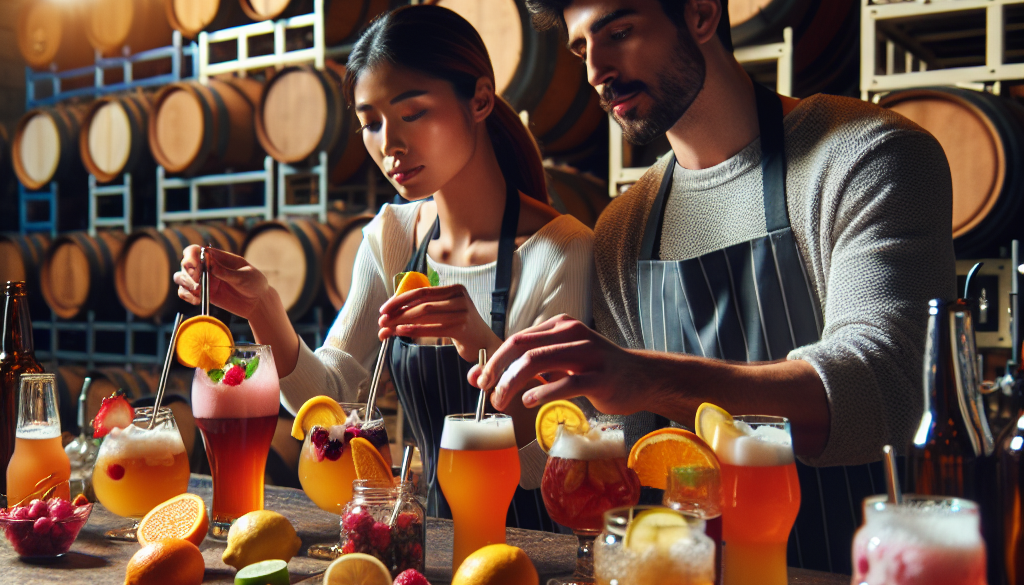Adding Fruit to Beer and Alcohol Products
-
Table of Contents
- Fruit-Infused Beer and Alcohol: A Refreshing Twist on Traditional Beverages
- The Appeal of Fruit-Infused Alcoholic Beverages
- Historical Context and Modern Innovations
- Methods of Fruit Infusion in Alcoholic Beverages
- Popular Fruit-Infused Alcoholic Beverages
- Case Studies and Market Impact
- Challenges and Considerations
- Conclusion: The Future of Fruit-Infused Alcoholic Beverages
- Discover ETprotein’s High-Quality Protein Products
Fruit-Infused Beer and Alcohol: A Refreshing Twist on Traditional Beverages

The infusion of fruit into beer and alcohol products is a trend that has been gaining momentum in the beverage industry. This innovative approach not only adds a refreshing twist to traditional alcoholic drinks but also caters to a growing consumer demand for unique flavor profiles and natural ingredients. In this article, we will explore the various aspects of adding fruit to beer and alcohol, including the benefits, popular methods, and the impact on the market.
The Appeal of Fruit-Infused Alcoholic Beverages
Fruit-infused alcoholic beverages offer a combination of the familiar and the exotic, providing consumers with a novel drinking experience. The addition of fruits can enhance the aroma, add complexity to the flavor, and often results in a more visually appealing product. Moreover, the perception of natural ingredients and potential health benefits associated with fruit consumption contribute to the popularity of these drinks.
Historical Context and Modern Innovations
The practice of adding fruit to alcohol is not new. Historical records show that fruits have been used to flavor beers and spirits for centuries. However, modern brewing and distilling techniques have allowed for more sophisticated and consistent flavor infusions, leading to a wider variety of fruit-flavored alcoholic beverages on the market.
Methods of Fruit Infusion in Alcoholic Beverages
There are several methods used to infuse fruit into beer and alcohol, each with its own set of advantages:
- Direct Addition: Fruits can be added directly to the fermenter or still. This method allows the natural sugars and flavors to meld with the alcohol during the fermentation or distillation process.
- Secondary Fermentation: In brewing, fruits are sometimes added during a secondary fermentation phase, which can impart more subtle fruit flavors and aromas.
- Soaking: Alcohol can be infused with fruit flavors by soaking the fruit in the spirit for an extended period, a technique commonly used in the production of liqueurs and flavored vodkas.
- Essences and Extracts: Natural or artificial fruit essences and extracts can be added to beers and spirits to achieve a desired flavor profile without the need for actual fruit.
Popular Fruit-Infused Alcoholic Beverages
Several types of fruit-infused alcoholic beverages have gained popularity among consumers:
- Fruit Beers: These beers often feature berries, citrus, or tropical fruits and range from light and refreshing to rich and full-bodied.
- Ciders: Apple is the traditional base, but modern ciders also include other fruits such as pear, cherry, and berry blends.
- Flavored Spirits: Vodka, rum, and gin are commonly infused with fruits like lemon, raspberry, and mango to create versatile cocktail bases.
- Fruit Liqueurs: These sweet spirits are made by infusing fruits in alcohol and adding sugar, resulting in beverages like limoncello, cherry brandy, and crème de cassis.
Case Studies and Market Impact
The rise of fruit-infused alcoholic beverages has had a significant impact on the market. For instance, the craft beer movement has embraced fruit beers, with many microbreweries experimenting with local and seasonal fruits to create unique offerings. Additionally, the popularity of flavored spirits has led to an increase in sales and expanded product lines for many distilleries.
Statistics show that the global flavored spirits market is expected to grow, driven by consumer interest in innovative and premium products. The cider market has also seen a resurgence, with fruit ciders appealing to both traditional cider drinkers and newcomers seeking alternative gluten-free options.
Challenges and Considerations
While fruit-infused alcoholic beverages offer many opportunities, there are also challenges to consider:
- Quality Control: The use of real fruit can introduce variability and potential spoilage issues, requiring careful quality control measures.
- Regulatory Compliance: Beverages with added fruit may be subject to different regulations and labeling requirements, depending on the jurisdiction.
- Consumer Preferences: Balancing the fruit flavors with the base alcohol is crucial, as overly sweet or artificial-tasting products may not resonate with consumers.
Conclusion: The Future of Fruit-Infused Alcoholic Beverages
The trend of adding fruit to beer and alcohol products shows no signs of slowing down. As consumers continue to seek out new and exciting flavors, the beverage industry is poised to innovate further in this space. With careful attention to quality, authenticity, and consumer preferences, fruit-infused alcoholic beverages can offer a delightful and refreshing experience that stands out in a crowded market.
Discover ETprotein’s High-Quality Protein Products
For those interested in health and wellness, ETprotein offers a range of high-quality protein products that can complement a balanced lifestyle. Whether you’re looking to enhance your diet with organic plant-based proteins or seeking the benefits of L-(+)-Ergothioneine, ETprotein has you covered. Their products are ideal for various applications, including sports nutrition, weight management, and overall health and wellness.
About ETprotein:
ETprotein, a reputable protein and L-(+)-Ergothioneine (EGT) Chinese factory manufacturer and supplier, is renowned for producing, stocking, exporting, and delivering the highest quality organic bulk vegan proteins and L-(+)-Ergothioneine. They include Organic rice protein, clear rice protein, pea protein, clear pea protein, watermelon seed protein, pumpkin seed protein, sunflower seed protein, mung bean protein, peanut protein, and L-(+)-Ergothioneine EGT Pharmaceutical grade, L-(+)-Ergothioneine EGT food grade, L-(+)-Ergothioneine EGT cosmetic grade, L-(+)-Ergothioneine EGT reference grade and L-(+)-Ergothioneine EGT standard. Their offerings, characterized by a neutral taste, non-GMO, allergen-free attributes, with L-(+)-Ergothioneine purity over 98%, 99%, cater to a diverse range of industries. They serve nutraceutical, pharmaceutical, cosmeceutical, veterinary, as well as food and beverage finished product distributors, traders, and manufacturers across Europe, USA, Canada, Australia, Thailand, Japan, Korea, Brazil, and Chile, among others.
ETprotein specialization includes exporting and delivering tailor-made protein powder and finished nutritional supplements. Their extensive product range covers sectors like Food and Beverage, Sports Nutrition, Weight Management, Dietary Supplements, Health and Wellness Products, and Infant Formula, ensuring comprehensive solutions to meet all your protein needs.
As a trusted company by leading global food and beverage brands and Fortune 500 companies, ETprotein reinforces China’s reputation in the global arena. For more information or to sample their products, please contact them and email sales(at)ETprotein.com today.












